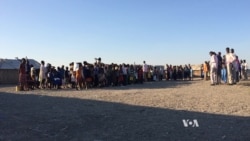A political dispute that spiraled into ethnic conflict in a country just three years old has left hundreds of thousands of South Sudanese displaced. Youths are now going through the same things their parents and grandparents experienced in the country’s decades-long war for independence.
But some of these young people are trying to set South Sudan on a better course.
When fighting started in Bentiu where Sunday Bayak lives, the 16-year-old fled like many other South Sudanese to a U.N.-protected site. Although the residents in his camp are filled with fear and anger, Bayak — who doesn’t know if the rest of his family is still alive — is trying to prevent others in his generation from following in the footsteps of their fathers.
Many of Bayak's male friends and peers took up arms with the rebels, either to take revenge for the killing of their relatives or out of hunger, or both. Others joined government forces.
Rather than follow them, Bayak is devoting his time to organizing youths in the camp — who make up about half of the 50,000 people — and giving them more constructive to do.
“My work with young children is to teach them," he said. "If they don’t know something, I’m going to teach them. If they’re going towards a bad way, I’m telling them that this way is not good for you and let us go to a good way and let us be in peace. We don’t need people to fight. We need to be in peace.”
Lately, youth gangs have emerged in the camps and have formed along the lines of the opposing parties. But Bayak helps organize games and discussions and teaches peace songs — an attempt to roll back war propaganda that the government broadcasts via FM radio into the U.N. camp.
Michael Deng Gaduel, a teacher who works at a makeshift school in the camp opened by the U.N. and humanitarian organizations, said youths are encouraged to come to the school and to try "to forget what has happened to them. Because some of the children, they have lost their family. So some of the children are vulnerable — they’re not able, they’re traumatized.”
Deng said the only solution to South Sudan’s conflict is for people to sit down and reconcile. Perhaps Bayak, and those young people he influences, will be able to show the way.





